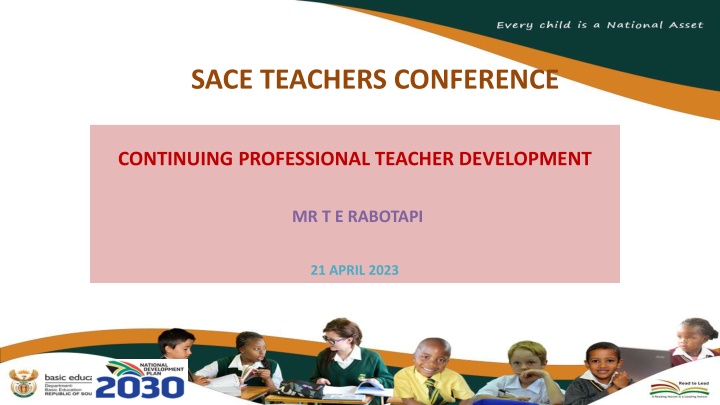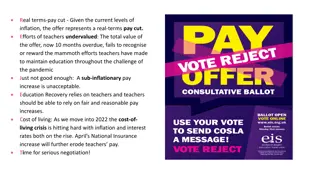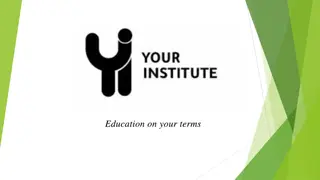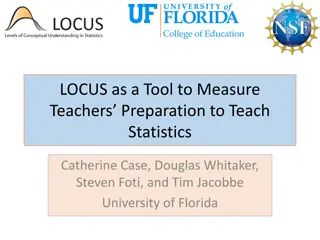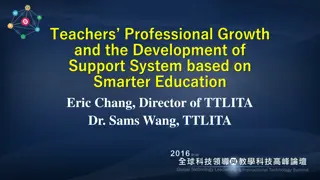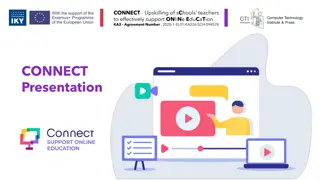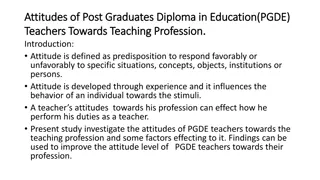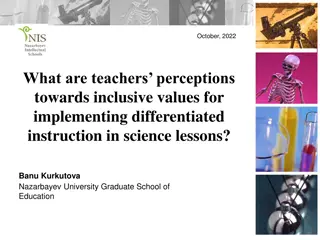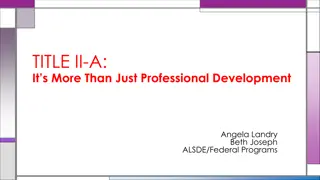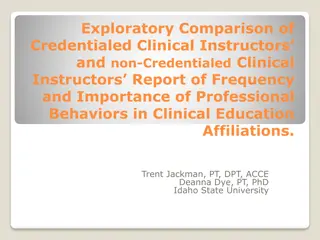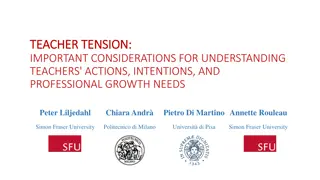SACE Teachers Conference: Enhancing Professional Development in Education
The SACE Teachers Conference focuses on improving teacher education through developing a National Framework for Teacher Education in SA. The Ministerial Committee on Teacher Education aims to create a coordinated system for both initial and continuing professional education. Recommendations include retiring the word 'qualified' and establishing a 'Licensed Teacher' category, implementing a Continuing Professional Teacher Development system, and requiring Licensed Teachers to earn PD points for maintaining their license. Previous initiatives like the Teacher Development Summit in 2009 aimed to address issues such as poor capacity, quality of programs, uncoordinated delivery, and lack of impact in the classroom. An Integrated Strategic Planning Framework for Teacher Education and Development is proposed to identify and address individual and systemic TD needs, attract high achievers to teaching, establish an accessible formal teacher education system, and enhance teacher support at a local level.
Download Presentation

Please find below an Image/Link to download the presentation.
The content on the website is provided AS IS for your information and personal use only. It may not be sold, licensed, or shared on other websites without obtaining consent from the author.If you encounter any issues during the download, it is possible that the publisher has removed the file from their server.
You are allowed to download the files provided on this website for personal or commercial use, subject to the condition that they are used lawfully. All files are the property of their respective owners.
The content on the website is provided AS IS for your information and personal use only. It may not be sold, licensed, or shared on other websites without obtaining consent from the author.
E N D
Presentation Transcript
SACE TEACHERS CONFERENCE CONTINUING PROFESSIONAL TEACHER DEVELOPMENT MR T E RABOTAPI 21 APRIL 2023
CONTENTS 1. Background 2. Ministerial Committee on Teacher Education 3. Framework overview 4. Synopsis from Research Reports 5. Skills Development Expenditure Trends 6. What is the problem 7. Trends in E-learning 8. What needs to be done 9. Teacher Professionalization 10. Opportunities 11. Recommendations 2
MINISTERIAL COMMITTEE ON TEACHER EDUCATION IN SA Mandated to: 1. Develop a National Framework for Teacher Education in SA; 2. to chart a long-term vision of a co-ordinated and coherent system of initial and continuing professional education of teachers 3. To focus on the systemic r le that teacher education has in the overall transformation of education. 4
MCTE CONT. RECOMMENDATIONS ON CPTD: Recommendation B14 Retire the word 'qualified' (and its cognates) from use, and request the SACE to establish a new category of Registration: 'Licensed Teacher'. Recommendation C16 Support the development of a Continuing Professional Teacher Development system by encouraging, resourcing and empowering the SACE to manage such a system. Recommendation C17 Authorize the SACE to fulfil its mandate for the professional development of educators by establishing a CPTD system, which will endorse professional development activities and allocate Professional Development Points to them, keep a register of endorsed PD activities and maintain a record of PD Points earned by Registered Educators. Recommendation C18 Require all Licensed Teachers to earn a specified number of PD points, in three-year cycles, as a condition for maintaining their License 5
TEACHER DEVELOPMENT SUMMIT:2009 WHAT THE SUMMIT SOUGHT TO ADDRESS: Poor capacity of the system to respond to TD needs; Poor quality of TD programmes Delivery of TD programmes that was uncoordinated, without proper institutional mechanisms; Programmes that were not needs based and without impact in the classroom; Unstructured funding mechanisms Poor systems for needs identification 6
OVERVIEW Integrated Strategic Planning Framework for Teacher Education and Development OUTPUT 1 OUTPUT 2 OUTPUT 4 OUTPUT 3 Individual and systemic TD needs are identified and addressed Increased numbers of high achievers are attracted into teaching An expanded and accesible formal teacher education system is established Teacher support is enhanced at a local level ENABLERS Time Collaboration Coodination Funding 7
ACTION PLAN TO 2019 TOWARDS SCHOOLING 2030 Goal 16: Teacher capacity and professionalism Improve the professionalism, teaching skills, subject knowledge and computer literacy of teachers throughout their entire careers. 8
SYNOPSIS FROM RESEARCH REPORTS 9
DPME RAPID RESEARCH Figure 2: Participation Rate by Programme Type Malaysia Conferences/seminars 33% Courses/workshops 91% Individual or collaborative research/reading professional literature 25% Mentoring and/or peer observation and coaching 35% Observation visits to other schools 20% Participation in a network 57% Qualification programme 10% 0% 10% 20% 30% 40% 50% 60% 70% 80% 90% 100% Source: 2018 TALIS Results (OECD, 2019) 18
DPME RAPID RESEARCH Figure 3: Participation Rate by Programme Type Finland Conferences/seminars 35% Courses/workshop 68% Individual or collaborative research/ reading professional literature 74% Mentoring and/or peer observation and coaching 14% Observation visits to other schools 25% Participation in a network 34% Qualification programme 11% 0% 10% 20% 30% 40% 50% 60% 70% 80% Source: 2018 TALIS Results (OECD, 2019) 19
DPME RAPID RESEARCH Figure 4: Participation Rate by Programme Type Korogwe District Council (Tanzania) ) Conferences/seminars 32% Courses/workshops 42% Individual or collaborative research/ reading professional literature 3% Mentoring and/or peer observation and coaching 8% Observation visits to other schools 0% Participation in a network 0% Qualification programmes 14% 0% 5% 10% 15% 20% 25% 30% 35% 40% 45% Source: 2018 TALIS Results (OECD, 2019) 20
SKILLS DEVELOPMENT EXPENDITURE TRENDS 2019-2022
SKILLS BUDGET ACROSS PEDs (70% of 1%) Province 2019-20 2020-21 2021-22 2022-23 Eastern Cape R203 991 053 R 215 562 466 R 199 601 220 R207 959 227 Free State R83 460 293 R 83 690 383 R 83 556 886 R89 072 396 Gauteng R256 284 609 R 267 401 141 R 273 347 949 R296 006 312 KwaZulu-Natal R317 865 527 R 323 356 523 R 309 021 097 R309 021 097 Limpopo R182 415 933 R 184 256 450 R 174 407 933 R188 469 652 Mpumalanga R121 921 436 R 123 904 599 R 130 086 236 R130 485 334 North West R94 360 952 R 95 982 292 R 96 773 222 R107 786 056 Northern Cape R36 913 877 R 38 208 618 R 37 478 245 R38 858 624 Western Cape R123 805 766 R 123 086 894 R 126 561 981 R129 867 626
TRENDS IN EXPENDITURE AS A PERCENTAGE OF SKILLS DEVELOPMENT BUDGET ACROSS PEDS: 2019-2022 2019-20 2020-21 2021-22 120% 100% 80% 60% 40% 20% 0%
WHAT IS THE PROBLEM Teachers have been exposed to a lot of training programs and workshops. These have proved to have little effect since not all teachers are able to put into practice what they have learned; Many teachers are not taking personal responsibility for their own development and are depending on workshops by the system. A mind-set shift is therefore required. The system of Teacher Professional Development has largely been manual and paper-based; Structures and programs for Teacher Development have not been sufficiently coordinated and funded, and The notion of teacher accountability within the system has been weak. 24
Trends in e-Learning 1. Increase amount of workplace learning 2. Improve learning analytics 3. Improve learning experience 4. Create smaller content learning objects 5. Increased informal professional learning
MICROLEARNING PROFESSIONAL LEARNING PROFESSIONAL DEVELOPMENT TEACHER TRAINING
WHAT NEEDS TO BE DONE There needs to be transition from Professional Development to Professional Learning; Access to learning opportunities by teachers need to be expanded More support to be provided to teachers on ability to diagnose and assess learning deficits and to put remedial measures in place; Time needs to be created within the school timetable for teachers to engage in their own learning and development; Opportunities need to be created for teachers to collaborate more through locally-based Professional Learning Communities; Teachers must be incentivised to engage in professional learning Development of teachers must focus on their well being as well as what happens in the classroom. Context is important. 27
TEACHER PROFESSIONALIZATION STATUS PRACTICE ACCOUNTABILITY Morale and Personal worth Conduct/ Behavior Image Recognition and Appreciation Opportunities for growth Professional Capital( Teacher Agency) Bureaucracy Profession Learner/Parents 28
PROFESSIONAL CAPITAL Fullan & Hargreaves (2012) HUMAN CAPITAL SOCIAL CAPITAL DECISIONAL CAPITAL 29
OPPORTUNITIES Platforms for delivery Institutes and centers Online TD Platform Time during school holidays Grant for management of CPTD CPTD Management system in place SACE ELRC Processes Revisit ELRC CA 4 of 2003 to address Career Pathing Management of skills budget Skills Levies 30
RECOMMENDATIONS Appoint more Departmental Heads Address criteria for appointing Principals and SMT Strengthern capacity for SMTs to support teachers and onsite capacity building Locus of Control back to school Time for PD to be created in school time table Use part of school holidays for PD Encourage Teacher Collaboration at local level Encourage individual learning through online TD Platform Create time for PD Re-visit collective agreement no.4 of 2003 to address career- pathing issues. More teachers to support their peers Opportunities to have mentors and coaches in schools Career-pathing 31
RECOMMENDATIONS Cont.. Create more opportunities for supervised practice teaching during initial training Monitor quality of programs tor Initial Teacher Training Align programs with sectoral expectations Strengthen content knowledge and pedagogic competence in programmes Strengthen Initial Teacher Training Amend appointment/promotion requirements into SMT to take into account issues of performance, including learner performance Only Teachers who shall have completed a certain number of PD Points(licensed Teachers) to be considered for appointment into promotional posts Incentivize Teachers Re-visit the concept of teacher licensing to create incentive for participation in CPTD A functioning and reliable system of CPTD points to be enforced Use CPTD grant to invest more in ICT systems for proper coordination Repositioning of SACE 32
RECOMMENDATIONS Cont.. 70% of the 1% for Skills levy to be protected and ring-fenced Protect Funding for CPTD Atleast 80% of the 50% to be used for school based Educators Strengthen Teacher Union Collaboration by allocating resources from Skills Levy Encourage teachers to belong to professional associations Partner with Universities to develop short courses More collaboration with ETDP SETA Strengthen partnerships Strengthen structures and platforms for CPTD Capacitate structures for CPTD at all levels of the system( NICPD, PTDIs, DTDCs) Strengthern and support PLCs Capacitate oversight structures for CPTD e.g NTEDC, PTEDCs Invest more in ICT Systems 33
